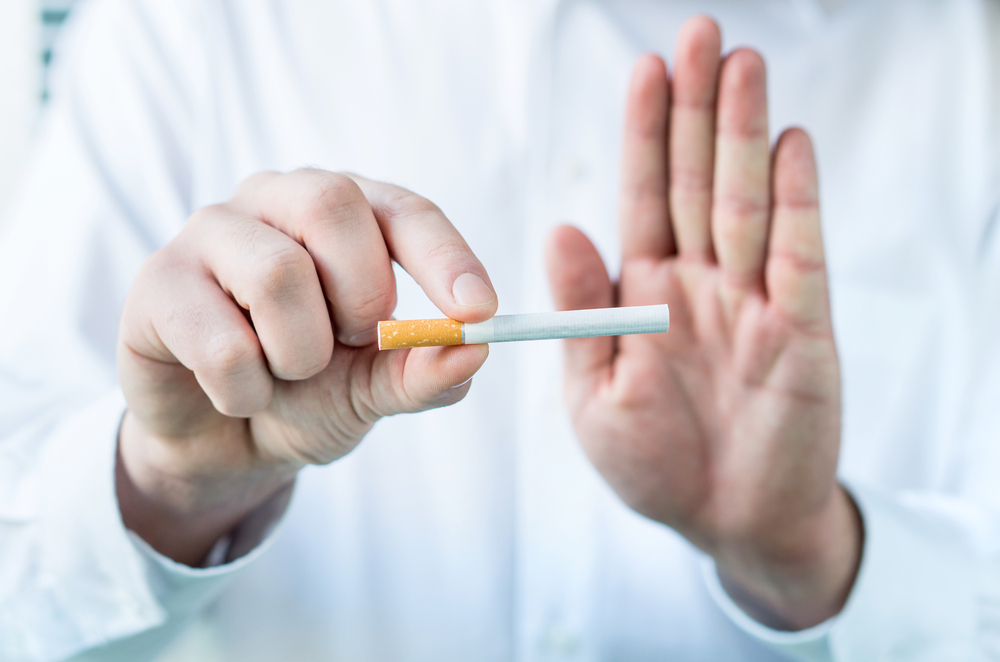Nicotine is a toxic, oily liquid. It is the psychoactive substance that accounts for the addictive properties of tobacco, such as chewing tobacco, cigarettes, and e-cigarettes. Inhaled smoke delivers nicotine to the brain within 20 seconds. Nicotine works by activating the reward pathways in the brain. More specifically, when nicotine is absorbed and subsequently metabolized into one’s body, it produces a release of adrenaline (epinephrine) from the adrenal glands. The release of adrenaline stimulates the body and causes an increase in blood pressure, respiration, and heart rate, eliciting feelings of pleasure and a surge of energy. Nicotine is the most addictive of the well-known and commonly studied drugs, partly because, according to Healthline, it can cause effects such as:
- Boosting mood
- Reducing depression
- Reducing irritability
- Enhancing concentration and short-term memory
- Producing a sense of well-being
- Reducing appetite
The elimination half-life, meaning the length of time the substance will remain in one’s system until the concentration in one’s blood has been reduced by half, of nicotine is approximately 2 hours.
Withdrawal Symptoms
Nicotine withdrawal can cause both physical and psychological symptoms that occur because of rapidly quitting, or significantly reducing, one’s nicotine intake. Each young person will have a different experience of nicotine withdrawal. Some teenagers may experience only mild symptoms for a short time, whereas others may struggle with intense cravings and longer-lasting symptoms. Common examples of nicotine withdrawal symptoms could include, but are not limited to, any combination of the following, provided by Medical News Today:
- Psychological symptoms of nicotine withdrawal may include:
- A strong desire or craving for nicotine
- Irritability
- Frustration
- Low mood
- Difficulty concentrating
- Anxiety
- Mood swings
- Physical symptoms of nicotine withdrawal may include:
- Headaches
- Sweating
- Restlessness
- Tremors
- Difficulty sleeping
- Increased appetite
- Abdominal cramps
- Digestive issues, including constipation
Withdrawal symptoms generally present between 4 to 24 hours after one’s last nicotine fix. The symptoms typically peak about 3 days after quitting and will gradually subside over the subsequent three to four weeks. Nicotine withdrawal is not considered dangerous nor is it associated with life-threatening health risks. The danger lies in the continued use of nicotine. Cigarette smoking accounts for nearly one of every five deaths in the United States each year, and as indicated by the Centers for Disease Control and Prevention (CDC) there are over 480,000 deaths each year from cigarette smoking.
For Information and Support
Every family in need of mental health treatment must select a program that will best suit the needs of their family. When one member of a family struggles, it impacts everyone in the family unit. To maximize the benefits of treatment we work closely with the entire family to ensure that everyone is receiving the support they need through these difficult times. Seeking help is never easy, but you are not alone! If you or someone you know needs mental health treatment, we strongly encourage you to reach out for help as quickly as possible. It is not uncommon for many mental health difficulties to impact a person’s life, long term. Pursuing support at the beginning of one’s journey can put the individual in the best position to learn how to manage themselves in a healthy way so they can go on to live happy and fulfilling lives.
OUR KNOWLEDGEABLE ADMISSIONS TEAM CAN BE REACHED 24/7 AT INFO@PACIFICRTC.COM OR CALL: 800-531-5769






